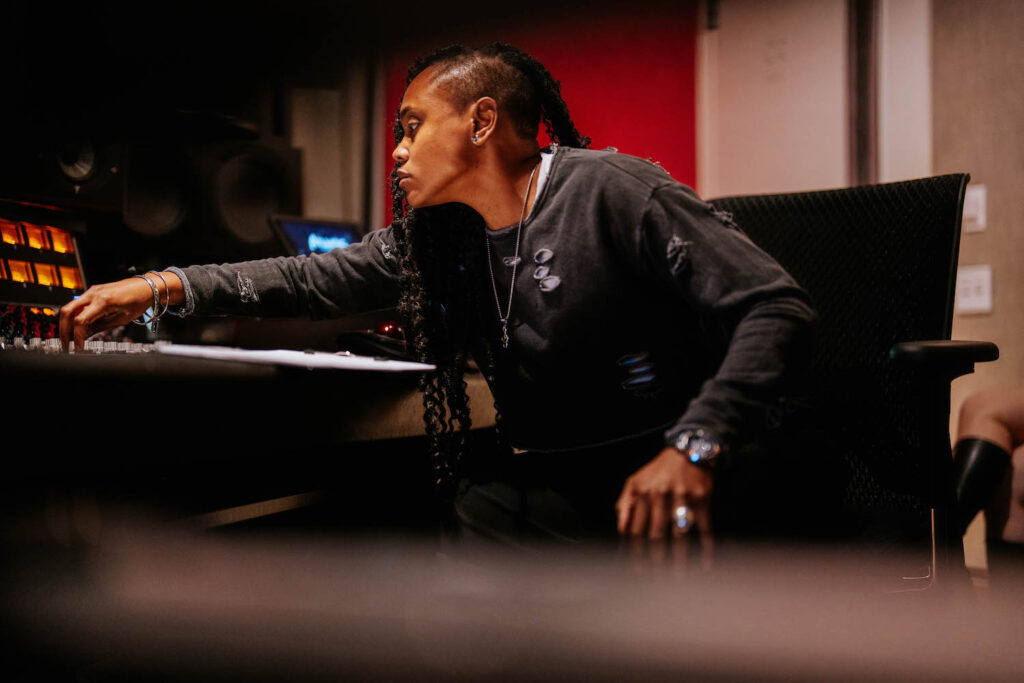This post is more than
Charity Spotlight – Black Lives In Music
25th May 2025
Every year, thanks to the support of our Festival-goers, crew and volunteers, Glastonbury is fortunate enough to be able to make charity donations to many amazing organisations working to make life better for those in need.
In this feature, the second in our Charity Spotlight series, we shine a light on one of these inspiring charities and the dedicated people behind them.
Black Lives In Music is a charity defiantly working to bring about equal opportunities for Black, Asian and Ethnically Diverse people in the music industry by inspiring and nurturing talent at the grass roots level and fighting to see it flourish in all areas and at all levels of the industry.
We caught up with charity founder, Charisse Beaumont, to find out more.
Tell us a bit about BLiM?
Black Lives in Music (BLiM) is a charity dedicated to making sure the UK music industry is a place where everyone – especially Black and Global Majority people – can thrive; on stage, behind the scenes and at every level of leadership. Whether you’re a sound engineer, violinist, rapper or record executive, our message is simple: you belong in this industry.
How did the charity come into being?
BLiM was founded in 2020 by Roger Wilson, a classically trained musician, and myself, a former music industry professional, after we found there was a lack of data concerning the lived experience of Black and Global Majority music creators across the music ecosystem. As a direct response, we published our first report, Being Black In The UK Music Industry, in 2021. The report data showed 63% of Black music creators have experienced racism and 88% of Black music professionals face barriers to career progression. This proved to be a powerful mirror held up to the industry, confirming what many already knew but few had the data to prove. That moment sparked a movement and from it, BLiM the charity, was formed.
What does BLiM aim to do?
We’re here to break down the barriers that stop Black and ethnically diverse people from progressing in the music industry. We’re pushing for change in education, employment, orchestras, leadership and creative spaces. It’s about ensuring that from the first music lesson to the biggest festival stage, everyone has access and opportunity.

How are you working to bring about positive change?
We work with 110 music organisations, universities, record labels and festivals to embed inclusivity in everything they do. Our BLiM charter sets the standard. We run programmes like Turn it Up and Equaliser to train people in technical professions and give them opportunities, particularly in areas where representation is low, like sound engineering. In fact, this year, our engineers will be working at Glastonbury. We are sending our crew of Black and gender diverse women to engineer at the Festival. Now that’s representation in action!
BLiM work particularly hard to open up opportunities in the jazz and classical music industries. What is different about these industries compared with other music genres in the UK?
Jazz and classical music are rich with history but they’ve often felt closed to people of colour. These spaces are more formal, more institution-led, and, sadly, often less diverse. That’s why we focus on them. We want to make sure conservatoires, orchestras and jazz venues are places where Black and Global Majority talent is celebrated. We run a program called Recruiting Classical which each year sees over 600 Global Majority players audition for the top orchestras in the UK. Another program is Classically Black, which showcases the very best in cutting-edge classical music – our next symposiums will be taking place in Birmingham (October 10th), and London (October 18th). We have over 40 orchestras signed-up to our ten-point plan on inclusive recruitment in classical music, which supports a unified approach of recruitment of musicians in orchestras in the UK classical music sector.
What impact have you had?
Our research has had a huge impact. Being Black In The UK Music Industry, Unseen Unheard (which looked at the lived experience of Black disabled creators and professionals), and Your Safety, Your Say – our research into bullying and harassment in the music industry – have led to national conversations and tangible change at government level. Our REMEL (Race Equality in Music Event Licensing) research has seen us give recommendations to the Deputy Prime Minister, Mayor of London and Chancellor of Exchequer. We launched an Anti Racist Code of Conduct and will launch EquiTrack, a tech tool which will help the UK Music Industry reach their diversity objectives. And our training programmes are placing young people into real jobs and roles they never imagined possible, like working on major festivals and classical stages.
What is the most rewarding thing about the work that you do?
It’s seeing someone walk into a space they once thought wasn’t for them and realise they belong. It’s the emails that say, “I was about to give up, but BLiM reminded me why I started.” It’s the young sound engineer working their first big stage. Those are the moments that keep us going.
How can someone benefit?
If you’re working in music, we’re here to support you through mentoring, training, advocacy and connection. And if you’re an ally, there’s room for you too. We welcome volunteers, donors and organisations that want to do better. Whatever your role, you’ll find that being part of BLiM means being part of a movement that’s bigger than any one of us.
How do organisations like Glastonbury’s help BLiM?
Support from Glastonbury and others is vital. They help turn inclusion from talk into action. By offering opportunities to our engineers, they’re not just diversifying their crew, they’re setting a new standard for the industry. Their platform also amplifies our voice, helping us reach more people, open more doors and create more impact. It’s a partnership that proves representation works, on stage, off stage and everywhere in between.
Where can people find out more about supporting you or getting involved?
Visit blim.org.uk to sign up, donate, partner or just learn more. Follow us @BlackLivesInMusic on IG and TikTok and @blklivesinmusic on X to join the conversation. There’s a place for everyone in this industry and we need all of us to make sure everyone has the chance to fulfil their ambition.
